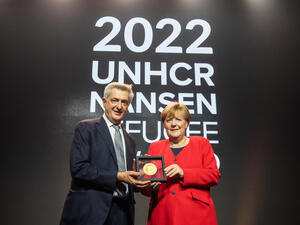UNHCR sets out detailed plan to solve refugee situation in Europe
UNHCR sets out detailed plan to solve refugee situation in Europe

A Syrian refugee woman waits with her children for an opportunity to cross the border from Greece in to the Former Yugoslav Republic of Macedonia.
GENEVA, March 4 (UNHCR) - Warning Europe was running out of time to solve the current refugee situation, the UN refugee chief today outlined a detailed six-point plan ahead of a key meeting of European Union leaders and Turkey in Brussels next week.
Filippo Grandi, the United Nations High Commissioner for Refugees, called for strong leadership and vision to address what he said was "as much a crisis of European solidarity as it is a refugee crisis."
"The collective failure to implement the measures agreed by EU Member States in the past has led to the current escalation in the crisis," Grandi added.
UNHCR, the UN Refugee Agency, notes the situation is quickly deteriorating with some 35,000 people now in Greece, of whom nearly 20,000 are in the Idomeni region with around 11,000 on or near the border with the former Yugoslav Republic of Macedonia.
Although the Greek authorities and military have ramped up their response, thousands are sleeping in the open without adequate reception, services, aid or information. With tensions mounting, the situation could escalate quickly into a full-blown crisis.
But Grandi also said it was not too late if the right actions were taken now.
"We are running out of time, and strong leadership and vision are urgently needed from European leaders to deal with what is, in our view, a situation that can still be managed if properly addressed," he detailed.
UNHCR is supporting the Greek Government's efforts by deploying staff, helping coordinate the response and providing emergency shelter, technical support and information to refugees and migrants.
Grandi's plan to EU Member States to manage and stabilize the refugee situation calls for:
1) The full Implementation of the so-called "hot spot" approach and relocation of asylum seekers out of Greece and Italy and, at the same time, to return individuals who do not qualify for refugee protection, including under existing readmission agreements.
2) Step up support to Greece to handle the humanitarian emergency, including for refugee status determination, relocation, and return or readmission.
3) Ensure compliance with all the EU laws and directives on asylum among Member States.
4) Make available more safe, legal ways for refugees to travel to Europe under managed programmes - for example humanitarian admission programmes, private sponsorships, family reunion, student scholarships and labour mobility schemes - so that refugees do not resort to smugglers and traffickers to find safety.
5) Safe-guard individuals at risk, including systems to protect unaccompanied and separated children, measures to prevent and respond to sexual and gender-based violence, enhancing search and rescue operations at sea, saving lives by cracking down on smuggling, and countering xenophobia and racism targeted at refugees and migrants.
6) Develop Europe-wide systems of responsibility for asylum-seekers, including the creation of registration centres in main countries of arrival, and setting up a system for asylum requests to be distributed in an equitable way across EU Member States.
UNHCR's proposals make clear that equitable sharing of responsibility is key to bringing about a managed and orderly solution, and that EU Member States would need to agree a system of percentages of asylum-seekers for each Member State to take.
"Europe has successfully dealt with large-scale refugee movements in the past, during the Balkans Wars for example, and can deal with this one, provided it acts in a spirit of solidarity and responsibility sharing," said High Commissioner Grandi.
"There is really no other option than working together to solve this."
For more information, click here.








